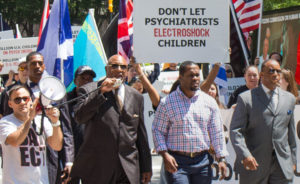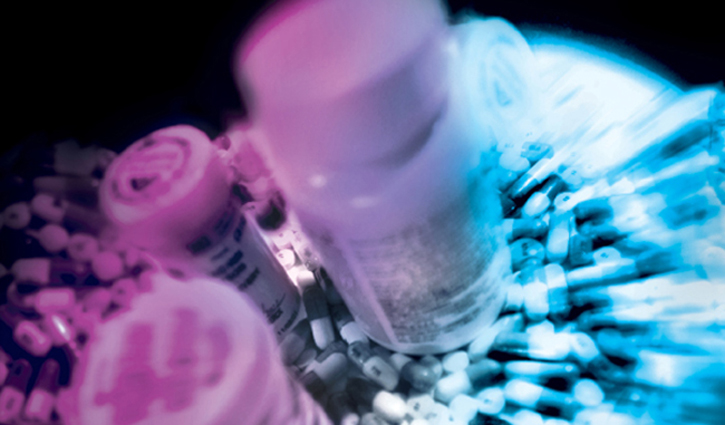CCHR spokesperson, Fred Shaw, warns about antidepressant adverse effects and risk of African Americans being prescribed electroshock treatment when antidepressants fail. Calls it “double jeopardy: prescribed drug addiction and brain damage.”
By CCHR International
The Mental Health Watchdog
August 25, 2020
The Journal of the American Osteopathic Association published a study that further confirms withdrawal effects from antidepressants that more than 44 million Americans are taking.[1] With psychiatrists also admitting at least a 30% chance of the drugs being ineffective, Citizens Commission on Human Rights International (CCHR), a mental health industry watchdog—which says any effectiveness is questionable—said it is concerned that this could lead to Americans also being recommended for electroshock treatment.
Rev. Frederick Shaw, a spokesperson for the group and Executive Director of the NAACP Inglewood-South Bay branch, said that he fears that “in the wake of the recent acknowledgment of the pain that racism causes and injustice, more African Americans could be prescribed antidepressants without knowing of their adverse effects and withdrawal risks. Electroshock may also be recommended, causing even worse effects on the brain. It’s double jeopardy: prescribed drug addiction and brain damage.”
The global antidepressants market is expected to grow from $14.3 billion in 2019 to about $28.6 billion in 2020, with the market surging during the current pandemic.[2] And, arguably the impact of racism, Shaw adds. Electroshock treatment is an estimated $3.5 to $5.4 billion a year market in the U.S.
The Midwestern University Chicago College of Osteopathic Medicine study said antidepressants are not considered addictive in that users do not seek them to “get high,” but they can cause dependence.[3] The newly published book, Children of the Cure: Missing Data, Lost Lives and Antidepressants, said that in the mid-1990s, an antidepressant manufacturer recognized the effect, held a meeting of “opinion leaders” and invented the term “antidepressant discontinuation syndrome” to deflect from dependence problems.[4]
“Many people experience grave difficulties in discontinuing from treatment” with antidepressants, Children of the Cure reports. “In lay terms, you can just as easily become hooked on SSRIs [antidepressants] as on benzodiazepines or opiates, and SSRIs can be more difficult to get off than anything else. For most of us this is the meaning of addiction.”[5]
Withdrawal effects include influenza-like symptoms, headache, lethargy, abdominal pain, diarrhea, insomnia, dizziness, nausea, imbalance, electric shock sensations, irritability, anxiety, and low mood.[6]
The College of Osteopathic Medicine study recommended gradual reductions in dosing rather than abrupt discontinuation. However, even then gradual tapering of an SSRI “does not completely prevent antidepressant discontinuation syndrome.”[7]
The effectiveness of the drugs is also debatable as they don’t cure depression or correct the now discredited theory that a chemical imbalance in the brain causes depression. “That was marketing hype to sell drugs, the pharmaceutical industry now admits,” Shaw added. “Consumers were deceived, just as they were about and antidepressants not being addictive, which is now proved to be false.”
 Shaw, who recently organized a Task Force Against Racism and Modern Day Eugenics, said, “For years, psychiatrists have claimed that Black Americans have not received electroshock—the passage of up to 460 volts of electricity through the brain—as whites. However, federal and state government agencies do not closely monitor the use of ECT, if at all. They don’t know how many people undergo electroshock, which causes memory loss and brain damage.”
Shaw, who recently organized a Task Force Against Racism and Modern Day Eugenics, said, “For years, psychiatrists have claimed that Black Americans have not received electroshock—the passage of up to 460 volts of electricity through the brain—as whites. However, federal and state government agencies do not closely monitor the use of ECT, if at all. They don’t know how many people undergo electroshock, which causes memory loss and brain damage.”
He points to several famous African Americans ruined after psychiatric treatment, especially electroshock, including brilliant jazz pianist Bud Powell (1924-1964) and legendary bass-baritone Paul Robeson (1898-1976).
In 1945, Powell, an extraordinary genius, who also helped create “bebop,” was suffering the effects of a severe police beating and was admitted to Belleview psychiatric hospital in New York. On the admission form he wrote under occupation: “Pianist and composer of over 1,000 songs.” The psychiatrist diagnosed this as “delusions of grandeur” and put him in a straitjacket. From the beating he suffered excruciating headaches, seizures and erratic behavior. In 1947, he was institutionalized for 11 months and given electroshock. Friend Jackie Maclean said, “Bud didn’t remember too much, actually, about his life prior to going to the hospital because of the [ECT] treatment….” In 1959, Powell moved to France where he was kept on Thorazine, a powerful antipsychotic known as a “chemical lobotomy.” He died in July 1966 from a combination of liver failure, TB and malnutrition.[8]
ABC News reported the brutal treatment of Robeson, who fought for justice against racism. By the early 1960s, he was a “musical giant on the world stage.” He performed overseas, including in Russia. From 1941 Robeson was under surveillance by the FBI. In the 1960s, after he suddenly became ill and was hallucinating during a party in Moscow, he returned to London and was put in the Priory psychiatric hospital, where he received 54 doses of electroshock over two years. He was given a cocktail of powerful depressive and anti-depressive drugs. Friends finally managed to have Robeson transferred to a clinic in East Berlin where doctors questioned the high level of barbiturates and ECT he’d been administered. More than twenty years after his death, Robeson was awarded a Lifetime Achievement Grammy Award and a star on the Hollywood Walk of Fame. His work towards ending apartheid in South Africa was posthumously rewarded by the UN General Assembly.[9]
CCHR says addictive antidepressants and electroshock should never be used as “treatment” for the impact of racism or current social restrictions. CCHR recommends any withdrawal effects from antidepressants or electroshock damage be reported to it and to sign the petition to ban ECT.
References:
[1] Mireille Rizkalla, PhD, et al., “Antidepressant Discontinuation Syndrome: A Common but Underappreciated Clinical Problem,” The Journal of the American Osteopathic Association, Mar. 2020, Vol. 120, 174-178, https://jaoa.org/article.aspx?articleid=2761944; Statistics obtained by IQ Via, https://www.cchrint.org/psychiatric-drugs/people-taking-psychiatric-drugs/
[2] https://www.globenewswire.com/news-release/2020/04/21/2019282/0/en/Global-Antidepressants-Market-2020-to-2030-COVID-19-Implications-and-Growth.html
[3] Op cit., The Journal of the American Osteopathic Association
[4] David Healy, M.D., Joanna Le Noury, Julie Wood, Children of the Cure: Missing Data, Lost Lives and Antidepressants, (Samizdat Health Writer’s Co-operative Inc., 2020), pp. 43-44
[5] Ibid., p. 44
[6] Op cit., The Journal of the American Osteopathic Association
[7] Ibid.
[8] “Psychiatry Harming Artists,” Citizens Commission on Human Rights, (Los Angeles, 2004), p. 26, http://www.cchr.org.uk/downloads/Harming%20Artists.pdf; https://www.npr.org/sections/ablogsupreme/2012/09/27/161890387/five-essential-bud-powell-recordings
[9] “Paul Robeson: the singer who fought for justice and paid with his life,” ABC News, 7 June 2013, https://www.abc.net.au/radionational/programs/archived/intothemusic/paul-robeson/4691690



SHARE YOUR STORY/COMMENT